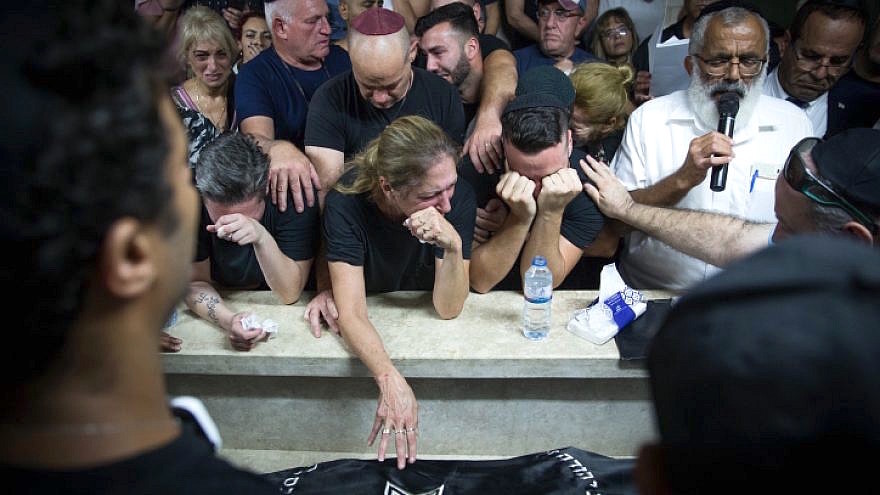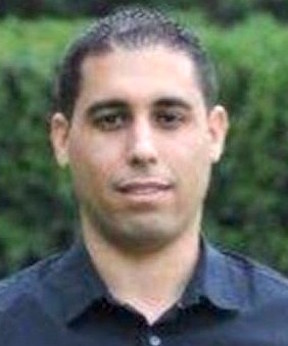Unbearable tragedy
Israel Defense Forces and other security personnel were in pursuit this week of the Palestinian who murdered, execution-style, two Israelis at the Barkan Industrial Park on Sunday morning.
“We grieve today for Kim Levengrond Yehezkel and Ziv Hajbi, may G-d avenge their blood,” Israel Prime Minister Benjamin Netanyahu said during a synagogue dedication at the Ein Keshatot archaeological site in the Golan Heights. “We will catch this heinous killer and we will settle the score. Israeli blood will not be spilled in vain.”
Yehezkel, of Rosh Haayin, a 29-year-old mother of an infant, was laid to rest on Sunday night in her hometown. Hajbi, a 35-year-old father of three from Rishon Letzion, was buried Monday afternoon in Moshav Nir Yisrael.
Both had been tied up and shot at close range. They died of their injuries at the scene.
Sara Vaturi, 54, was moderately wounded.
The killer was identified as 23-year-old Ashraf Walid Suleiman Na’alwa from the West Bank village of Shuweika, just north of Tulkarm.
The horrific incident took place as the three victims were beginning their workweek at Alon Group in the large industrial park, one of the few commercial centers to employ both thousands of Israelis and thousands of Palestinians.
Barkan, in central Samaria near the city of Ariel, 35 kilometers east of the Petach Tikvah, consists of 165 manufacturing factories. It is known to be an island of co-existence with Jews and Palestinians working together side by side. Of the 8,000 factory employees in the park, about 60 percent are Palestinian.
According to news reports, before Na’alwa — who worked as an electrician at Barkan — fatally shot Levengrond Yehezkel and Hagbi, he forced a 20-year-old Arab cleaner from Shechem to tie Levengrond Yehezkel’s hands behind her back with zip ties.
The cleaner, who was subsequently questioned by Shin Bet security services but not arrested, told authorities that Na’alwa threatened to kill him if he did not comply.
The gunman used an assault rifle and was caught on security cameras leaving the factory.
At Yehezkel’s levaya on Sunday, her father called for vengeance.
“Every terrorist should know he would be executed, and that his family will suffer for his crimes,” he said. “These people spit into the well they drink from, so maybe they don’t deserve to drink.”
Minister of Communications Ayoub Kara, a friend of the family, lamented at the levaya that terrorists were not eligible for a death penalty in Israel.
“It is a dark day,” said Kara. “I came to represent the government of Israel and to express solidarity with this dear family. I came to tell her husband and her baby, who will never again see his mother, I am sorry. I tried to advance a law to give the death penalty to terrorists, but I have not succeeded.”
Iris Hagbi, the mother of Ziv Hagbi, also called for the death of the terrorists.
“I want to convey a message — I wish none of the terrorists remain alive,” she said. “The terrorist’s family should suffer. He shortened the lives of the people there. He should be killed.”
David Ha’ivri, a political strategist who often brings influencers from around world on tours of Samaria, would show them the co-existence taking place in the industrial park in order to expose the BDS movement as being fraudulent.
The killer “had the same objectives as the BDS — to close the factories and sabotage the normalization of Jews of Arabs in this region,” Ha’ivri told JNS.
He explained that “the industrial park and the factories, as they are east of the Green Line, are the type of [places] targeted by the BDS [movement] that wants to label, tax and boycott products that are manufactured in Israeli factories in the West Bank. However, contrary to that idea, it is a huge benefit for the Palestinian workers to get a job at Barkan because the salaries are about three times higher than salaries in the Palestinian Authority.”
In addition, he explains that “the factories are also a huge benefit for the Palestinian workers because they do not need to cross over the Green Line into Israel for work. It’s much easier for them to receive security clearance to enter these areas, and, of course, it’s much closer to their homes.”
Avi Zimmerman, president and co-founder of the Judea and Samaria Chamber of Commerce and Industry, said that “as with previous terror attacks in this area, the terrorist does not live in any of the nearby Arab communities.
“The climate of economic cooperation goes well beyond any individual business or factory. It’s an ecosystem that impacts the fabric of life across the region,” Zimmerman said. “Because the local populace is not interested in disturbing the economic ecosystem that we have developed together, we find terrorism imported from other regions.”
Ashraf Jabari, the Palestinian co-founder of the chamber of with Zimmerman, strongly condemned the brutal attack.
“Someone [Arab] who works together [with Israelis] and then turns on them, this is not our way,” he said.
President Reuven Rivlin in a statement said, “This was not only an attack on innocent people going about their daily lives, it was also an attack on the possibility of Israelis and Palestinians co-existing peacefully. I call on the Palestinian leadership to condemn the attack and to use the forces at their disposal to capture the terrorist and those who aided him.”
Rafi Alon, owner of Alon Group, said he had always considered workers at his company — both Israelis and Palestinians — as “a family.”
He said he hopes the killer was simply a bad egg, but added that his faith in coexistence initiatives had been rattled.
The Hamas terror organization called the attack “a new chapter in our resistance in the West Bank.”
An Islamic Jihad spokesman, Daoud Shehab, said the attack is a reply to “Israel’s war crimes in Gaza, Jerusalem, the Bedouin village of Khan al-Ahmar and the damage Israel causes to the Al-Aqsa mosque. We call on our people to rise up against the settlements terror until the West Bank is freed from it.”

 45.0°,
Partly Cloudy
45.0°,
Partly Cloudy 









